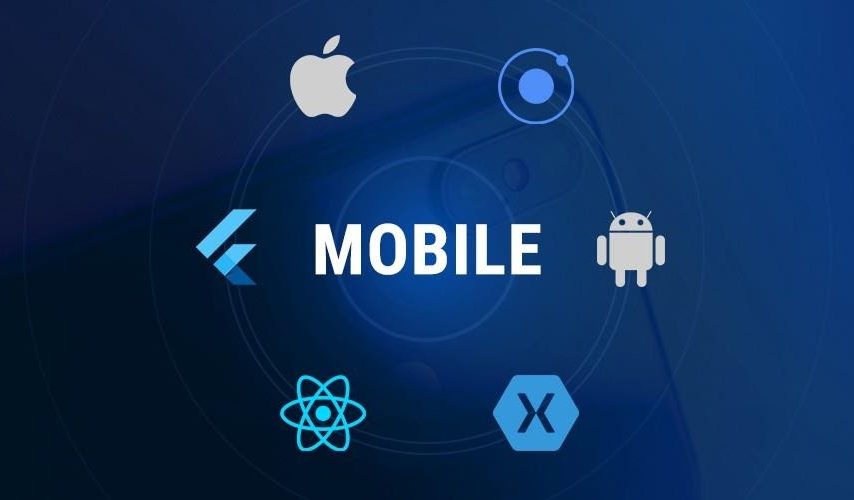E-commerce is being replaced by “m” or mobile commerce steadily (m-commerce is growing 200% faster than e-commerce), and the major e-commerce businesses are already deriving maximum sales and profits through their Android and iOS apps. As a relatively new development, it is now also possible for the developers to build cross-platform apps or hybrid apps that run on multiple operating systems. With a spurt in technology and its popularity, there are now several mobile app development frameworks that are open source and are free to access by all. We bring to you here the best of these technologies and frameworks to help you build world-class, intuitive, and revenue-generating apps. Some of these may also help you develop apps that can be run on different operating systems (including Android and iOS).
1.React Native
Owned and run by Facebook, React Native is one of the more popular open-source app development frameworks. The Java Library can be used for building native apps and UI for different operating systems. A single code can be shared across multiple platforms, and the apps also use the same platform and APIs. Cross-platform app development is seamless (more than 90% of the codes are reusable across operating systems), and iteration is fast. React Native already has the second-highest number of contributors on GitHub. SoftwareMansion, Bloomberg, Walmart, and Microsoft are only some of the big names supporting and using the technology for their apps.
2. Ionic
Ionic offers the default user interface elements, including action sheets, filters, tab bars, listed views, and the navigation menus, which proves to be quite convenient for the developers. With lots of work done already, it becomes easy for the developers to lay attention towards developing apps. The framework becomes even simpler and easier to use when developers know HTML and Java. Ionic supports iOS 7 (and above) and Android 4.1 (and above) versions. The platform provides for the development of cross-platform apps and is tuned towards delivering higher performance. App development using the framework is also less costly. Some of the important plugins available with Ionic include the Cordova plugins that can be used for accessing features, including GPS and Camera, among others. The McDonald’s food ordering app and apps of businesses, including Diesel, are made through the Ionic framework.
3. Flutter
Written in Dart, Flutter is a mobile app development framework launched by Google. A single code can be used for developing both iOS and Android apps, and the complete software development kit (SDK) has everything you need for developing the hybrid apps. Flutter can reduce the bridges which help in developing faster-starting apps. Developers also get better control over the system, as Flutter uses the operating system like a canvas for moving the different services. Developers get access to the automated testing kits, including unit, widget, and the integration testing kits.
Despite Dart, Flutter is quite easy to learn, and UI coding is fast due to the presence of custom and ready-made widgets. The upgrades are available and can be seen in real-time with the “hot reloading” feature. The apps are developed to provide excellent performance, as Flutter has a 60 fps rate (also used and found in the more modern screens). Alibaba, Google Ads, and SpaceX Go are some of the apps that have been developed using Flutter.
4. PhoneGap
Developers can build cross-platform apps through CSS, HTML, and JavaScript on PhoneGap (also called Apache Cordova), and only a single code needs to be created. Developers get access to a highly robust and capable library that provides for the building of the hybrid apps. Several testing tools can be used for testing, debugging as well as managing the apps. The framework also supports Camera GPS, accelerometer, and Storage, among other device features.
5. Sencha Touch
The framework can be used for the configuration and testing of Android applications through java systems and JavaScript. The robust framework has the best capabilities of Ext JS and uses languages, including CSS3, HTML5, and JavaScript, for better performance. Developers get access to a range of widgets, and the layouts help in their best positioning. Because the layouts are predefined, running the framework is quite easy and time saving for the developers. The framework will be liked by the new developers, as the Sencha Architect GUI tool creates high convenient interfaces. The command interface called Sencha CMD is important for functionalities, including scaffolding, theming, and app building. Sencha Touch Bundle includes the official plugins, while others can also be found on Sencha Market.
6. Xamarin
Xamarin is also one of the more efficient mobile app development frameworks that help developers share more than 90% of the codes across platforms, including Android and iOS. It is combined natively hence creates powerful apps that resemble the native looks. Xamarin also uses only C# for developing the apps of different platforms. The native looks are also bolstered by the UI coding (specific to platforms), which Xamarin allows the developers to create. Xamarin is owned by Microsoft. Apps, including those of Alaska Airlines, Picturex, The World Bank, and CA Mobile, among others, are built using Xamarin.
7. Intel XDK
A mobile app development company may prefer the Intel XDK framework for developing responsive apps that have interactive UI. The framework uses HTML5 and has multiple features to introduce innovation, as well. The “App Framework” also has the custom app templates, and the themes are supported by the different operating systems, including iOS and Android. Developers can also use the rich support for Topcoat UI, jQuery as well as Bootstrap 3. The drag-and-drop interfaces are quite convenient, and Cordova plugins are also available. Other features include demo apps, code developers, testing and debugging kits, and a clean interface for fast development of apps. Google Play Store has thousands of apps built using Intel XDK while they are also available on iOS.
8. Corona SDK
Corona SDK is quite powerful and capable of creating cross-platform apps as well as games. These can be easily published on the different devices. The use of the language ‘Lua” brings developers more power and speed. The use of the language can be seen in popular games, including Angry Birds, Warcraft, and Civilization. Hence developers can scale up and develop their games ten times faster using Lua, which is a great benefit of the Corona SDK. There is an extensive range of plugins present and available for functionalities, including media, analytics, in-app advertisements, and other functions. Further, if an API or library is not available through a plugin or at the core, developers can use the native libraries, including the Java, C, and C ++ libraries for calling purposes.
9. Native Android Framework
The SDK has many developer tools and native API libraries for developing mobile apps for Android. Many developers require app implementation in native codes and use languages, including C for the purpose, and native Android development is quite efficient and useful for them. The powerful platform can be used for developing Android apps only, however. Still, Android alone has billions of users now. Instacart, Slack, and Google are only some of the companies using the framework.
10. jQuery Mobile
The framework can use a single code for developing apps for the different popular operating systems. The best part is that gaining skills in its use will help developers build websites as well, along with mobile apps. The plugins of the framework are also being updated, and hence there is a good scope of building highly featured and powerful apps with greater convenience.
While it is important to look at the features, you should also consider the core strength of a mobile app development framework while choosing it. Different frameworks have different strengths, and it really may depend on your aspirations and needs as to what kind of framework you should choose.
Author Bio:
James Grills is a technical writer with a passion for writing on emerging technologies in the areas of mobile application development and IoT technology. He is a marketing advisor – currently associated with Cumulations Technologies, a leading app development company in Bangalore.








